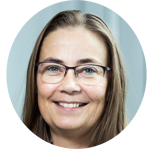The master programme
The courses are planned with a combination of seminars and ICT-supported activities to make it possible to combine a busy work and family life with studies at the university.
A course at Master of IT is 15 ECTS. A complete Masters programme consists of 60 ECTS – or the equivalent to a one-year full-time study. Almost all participants at Master of IT-study are part-time students. They are required to finish the study within 6 years if they want the diploma.
A flexible master
Professionals have found the flexible programme of Master of IT very attractive. More than half of the participants enroll the programme without having decided whether they just want one course or they want the full programme and a Master's diploma. They enroll because they find the courses interesting and relevant to their career and practice. The possibility of ending with a Master's diploma is, however, important to the students, but most of them decide later whether or not they want to continue in the programme and earn an MSc.
The programme has two tracks: Software Construction, and Organisation.



The guiding principle
The courses at Master of it are designed by the different universities, discussed in a forum across universities headed by It-vest and approved by the steering committee of It-vest.
The guiding principle is that a course should be relevant for practitioners and based on the latest research that meets rigorous academic standards.
The courses are designed with a mixture of theory in form of theoretical lectures and presentations and practice in the form of assignments and discussions that relate theory to the real life experience of the participants. A typical course will conclude with a “research in practice” assignment, where the student analyses challenges from his or her own organisation.
Admission to the Master in IT
Admission to the specialisation in Software Construction
Admission requirements
Admission to the Master in IT, specialisation in Software Construction, requires that the applicant holds one of the following:
- A bachelor’s degree in computer science
- A bachelor’s degree in software
- A bachelor’s degree in electronics and IT
- A bachelor’s degree in computer technology
- A diploma in information technology (software construction)
- A diploma in IT security
- A diploma in software development
- Bachelor of IT security
- Bachelor of software development
Additionally, you must have at least two years of relevant professional experience after completing the qualifying education.
Relevant professional experience means that you should have been involved in the development or implementation of IT or have experience in teaching IT.
Specific admission requirements
Participants are expected to have a basic understanding of functions, distance measures, vector and matrix operations, probabilities, descriptive statistics (mean, std. deviation, etc.), and should be familiar with Python and basic web programming.
Based on individual assessment, exemptions from the admission requirements may be granted if it is deemed that you have equivalent educational prerequisites to complete the program. Exemption from the requirement of two years of relevant professional experience after completing the qualifying education is not possible.
If you do not meet the formal admission requirements, please contact Continuing Education for further guidance.
Admission to the specialisation in Organisation
Admission requirements
You can be admitted to the Master in IT, specialisation in organisation, if you have:
- relevant educational background and, minimum two years of relevant work experience after completing education.
Educational background
The applicant must have completed at least:
- an academic bachelor's degree or,
- a professional bachelor's degree or,
- a medium-term higher education or,
- a diploma course completed as a regular course.
The following table shows the Master of IT courses:
Courses in Software Construction
- Microservices and DevOps
- Data Science and Big Data
- Secure Software Development
- Software Architecture in Practice
- Network Security
- Business Intelligence: Analyzing Large Databases
- Modern Security with Cutting-Edge Technologies
- Visual Analytics
Courses in Organisation
- Digital Innovation and Digital Transformation
- IT and Business Development in SME
- The IT Change Agent - Handling the Human Factor
- Behavior and awareness
- Data driven management
- IT Project Management
- The IT Manager
- Management of Enterprise Architecture
- Data driven development of it-supported work
- IT Strategy and Organization
- CoDesign
- Technical IT Security for generalists
- Artificial Intelligence and Qualitative Methods
- Cyber security, privacy, and regulation
- Business Continuity Management
Contact information
It-vest take care of general questions and overall guidance regarding the degree programme.
Therefore, you can always contact us by email or phone with questions and comments before, during and after your training course. We will help you directly or find out who to talk to.
Contact:
Bettina Lundgaard Hansen
Development Manager at It-vest
Telephone: +45 7027 6852
E-mail: blh@it-vest.dk




